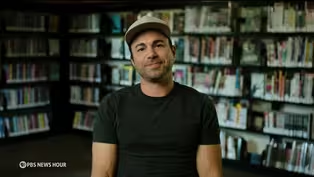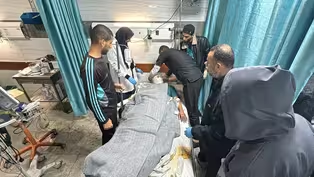
New mothers face barriers getting mental health care
Clip: 12/31/2024 | 9m 13sVideo has Closed Captions
New mothers face barriers getting the mental health care so many need
Maternal mortality rates have soared in the U.S. to nearly three times those of other high-income countries. Over 20 percent of deaths among new mothers are from suicide and overdose. Researchers and service providers have made progress in addressing postpartum depression and anxiety, but barriers to care remain. Ali Rogin reports as part of our Race Matters coverage.
Problems playing video? | Closed Captioning Feedback
Problems playing video? | Closed Captioning Feedback
Major corporate funding for the PBS News Hour is provided by BDO, BNSF, Consumer Cellular, American Cruise Lines, and Raymond James. Funding for the PBS NewsHour Weekend is provided by...

New mothers face barriers getting mental health care
Clip: 12/31/2024 | 9m 13sVideo has Closed Captions
Maternal mortality rates have soared in the U.S. to nearly three times those of other high-income countries. Over 20 percent of deaths among new mothers are from suicide and overdose. Researchers and service providers have made progress in addressing postpartum depression and anxiety, but barriers to care remain. Ali Rogin reports as part of our Race Matters coverage.
Problems playing video? | Closed Captioning Feedback
How to Watch PBS News Hour
PBS News Hour is available to stream on pbs.org and the free PBS App, available on iPhone, Apple TV, Android TV, Android smartphones, Amazon Fire TV, Amazon Fire Tablet, Roku, Samsung Smart TV, and Vizio.
Providing Support for PBS.org
Learn Moreabout PBS online sponsorshipNICK SCHIFRIN: In the United States, the rate of maternal mortality has soared to nearly three times that of other high-income countries.
And among new mothers, mental health disorders are the leading cause of death.
Health care providers have made progress in addressing the most common maternal mental health disorders, anxiety and postpartum depression.
But barriers to care remain and disproportionately affect women of color.
Ali Rogin reports as part of our Race Matters coverage.
ALLOCIANNA JONES, Mother: Yes, good job, Aiden (ph).
Yay!
ALI ROGIN: Allocianna Jones gave birth to her son Aiden last summer.
ALLOCIANNA JONES: Aiden is, I might be a little biased, but the best baby.
(LAUGHTER) ALLOCIANNA JONES: His favorite color is red.
He's super goofy and he loves to dance.
ALI ROGIN: The birth was challenging.
And soon after he was born, once the initial flood of emotions passed, she started feeling something else, something she'd never felt before.
ALLOCIANNA JONES: I'm typically an outgoing, happy, bubbly person.
However, I was not postpartum.
I was self-isolating.
I was sad.
I wasn't sleeping at all.
Things on social media just made everything worse.
It was not pretty.
It was not me and something was wrong.
ALI ROGIN: Jones was experiencing postpartum depression, which can be a severe, long-lasting mood disorder that affects roughly 14 percent of new moms.
Yet the majority of women experiencing maternal mental health conditions go without treatment or a diagnosis.
ALLOCIANNA JONES: I know everybody says you're not the only one, you're not the only one.
But, in that moment, it feels like it.
It feels like you're at the bottom of a hole and there is no way out.
ALI ROGIN: While there is no single cause of postpartum depression, genetics, stress, and physiological changes like the hormonal shifts new mothers experience all play a role.
DR. CATHERINE MONK, Columbia University Irving Medical Center: Twenty years ago, we wouldn't be having this conversation for the most part.
ALI ROGIN: Dr. Catherine Monk is the chief of the Division of Women's Mental Health and Obstetrics and Gynecology at Columbia University Irving Medical Center.
DR. CATHERINE MONK: We have really made a lot of progress the last 20 years, and it's very exciting.
There are evidence-based treatment.
There are more and more people who are specializing in reproductive psychiatry, reproductive psychology.
We're understanding more the roles of prevention that can come with the social support from people's communities and networks.
ALI ROGIN: But, Dr. Monk says, there are still many hurdles to getting care.
Black mothers are referred to mental health professionals less often, even though they are impacted at higher rates.
ALLOCIANNA JONES: As a woman of color, it's even more difficult and even more scary.
ALI ROGIN: Her fear of becoming a statistic led Jones, who lives in the suburbs of Detroit, to search out Birth Detroit, a Black-led midwife practice, to deliver her baby and also to care for her after giving birth.
ELON GEFFRARD, Co-Founder, Birth Detroit: If you imagine your medical experience, you have been pregnant practically a year, and then you're told after maybe 24 to 48 hours' stay, we will see you later.
Enjoy your new baby.
ALI ROGIN: Elon Geffrard is one of the co-founders of Birth Detroit, which is designed to address the gaps in maternal care for Black mothers from pregnancy to several months into postpartum, when the focus is traditionally on the baby, not the mother.
ELON GEFFRARD: Birth Detroit, we are in the home within 24 hours after birth.
Then we're seeing you again at, like, day three or four.
Then we're seeing you again at day seven.
And then we see you again in two weeks.
We have health care professionals in the home assessing the family right in their own environment.
And we're able to catch those things that can be more serious before they become more serious.
ALI ROGIN: Jones says she was lucky her midwife recognized her symptoms and referred her to care.
ALLOCIANNA JONES: You hear about these things, postpartum depression, postpartum, anxiety, but you don't have a blueprint of, here are the items to look for.
ALI ROGIN: Jones received counseling and medication, but her midwife also referred her to a new center in nearby Ferndale, Michigan, offering something different.
MELISSA SCODELLARO, Fourth Tri Sanctuary: We really wanted a space that moms could come and settle and spend hours.
ALI ROGIN: Melissa Scodellaro is the co-founder of Fourth Tri Sanctuary, one of a handful of postpartum centers that have recently opened across the country, catering to new mothers seeking support and community.
MELISSA SCODELLARO: The space was designed to be approachable and to help moms feel welcome and to be able to watch each other as well, because there's so much in learning in watching each other, and there's so much forgiveness that you can give yourself when you watch another mom do things.
ALLOCIANNA JONES: The first day I came, I stayed the whole day, did not want to leave, and I kept coming back.
It feels like a safe place for you to be vulnerable.
ALI ROGIN: Part day care, part cafe and with a spa-like atmosphere, Fourth Tri Sanctuary allows mothers to socialize with other moms, join information sessions, bathe their babies, or hand them off to experienced on-staff doulas while they shower, nap or get their hair done.
MORGAN VANDERKAAY, Mother: The first week when I came here, all I did was sleep, which was really great.
ALI ROGIN: After the birth of her first son, Morgan Vanderkaay was diagnosed with postpartum anxiety, a common condition marked by excessive worrying and feelings of panic after childbirth.
MORGAN VANDERKAAY: I was crying a lot.
I mean, there was no sleep as well, which doesn't help.
And I felt very anxious, which I had never really felt before.
And I just felt like I was going to fall down the stairs and, like, land on my baby and no one would be home and we would both be dead.
It just, like, seemed so severe.
ALI ROGIN: She gave birth to her second son in September, and she credits Fourth Tri for an easier postpartum period this time around.
MORGAN VANDERKAAY: I just felt calmness.
People check on you.
How are you doing?
How was your night?
It's just been so nice to just sit in a relaxing hot shower and let the stress kind of melt off of you.
I couldn't ask for a better postpartum period this time.
ALI ROGIN: Fourth Tri is a concept that came to Scodellaro, a mother of two, in her career as a salon owner, where she saw many new mothers looking for reassurance.
MELISSA SCODELLARO: Someone would find me at a wedding and be like, is it OK that I give my baby formula today?
And I'm thinking, there must be a gap in the system if you're finding your hairstylist at a wedding and asking how you should feed your baby.
WOMAN: It's going to change because your baby's going to change.
As they get more solids, they usually take less breast milk.
ALI ROGIN: Answering those new mom questions is what Fourth Tri aims to accomplish with their daily fireside chats, informal conversations with experts.
WOMAN: And every mother was very worried about these babies, but I was more worried about you guys.
ALI ROGIN: But all these amenities come at a cost, ranging from $35 for 90 minutes to $900 for a monthly pass.
While clients can pay with a health savings account, Fourth Tri does not currently accept insurance, but they are working to get their services covered because Scodellaro says she knows her center is helping new moms.
MELISSA SCODELLARO: We have moms that walk in here a shell of themselves.
They're not smiling.
They're crying.
And by day five, they're like, this is a good day.
The space was designed to empower moms and to give them a space to practice being a mom.
ALI ROGIN: But that space can be hard to find.
DR. CATHERINE MONK: The biggest impediment to recovery from a mental health issue is access to care.
We really do have tools.
We have evidence-based psychotherapies.
We have pharmacology.
The combination of the two is what's really the gold standard when medication is needed.
ALI ROGIN: But medications can be pricey, like the one approved just last year by the FDA, the first pill for severe postpartum depression.
A two-week course costs nearly $16,000, and insurance coverage is inconsistent.
Dr. Monk says progress has been made when it comes to treatment, but insurance companies simply haven't caught up.
DR. CATHERINE MONK: We have developed a lot of work-arounds, and we have not tackled the elephant in the room, which is reimbursement rates for mental health care for people who want to use their insurance to cover it.
It is absolutely the elephant in the room.
ALI ROGIN: Back at Fourth Tri, Scodellaro has tried to make her services accessible to more women by offering scholarships in the form of a monthly pass to moms who are unable to afford them.
Jones was one of the recipients, and she plans to keep visiting Fourth Tri even after it expires.
She says it's a much-needed continuation of care for her son and her.
ALLOCIANNA JONES: Pregnancy doesn't just stop after you give birth, which is what it seems like our nation has ingrained in their brain.
I don't think that it's a shock that postpartum depression is so high, unfortunately.
But I do think it's a shock for the lack of care following postpartum depression.
I do think that it's scary how limited moms have support there.
ALI ROGIN: Support that places like Fourth Tri are providing, because it takes a village to raise a child and a mom.
For the "PBS News Hour," I'm Ali Rogin in Ferndale, Michigan.
A Brief But Spectacular take on being amazed at the world
Video has Closed Captions
Clip: 12/31/2024 | 3m 42s | Mark Rober's Brief But Spectacular take on being amazed at the world around us (3m 42s)
College football's expanded playoff is reshaping the sport
Video has Closed Captions
Clip: 12/31/2024 | 7m 21s | How the expanded playoff and unprecedented money is reshaping college football (7m 21s)
Death of man beaten by corrections officers sparks outrage
Video has Closed Captions
Clip: 12/31/2024 | 2m 57s | Death of New York man beaten by corrections officers sparks outrage and protests (2m 57s)
How artificial intelligence affected our lives in 2024
Video has Closed Captions
Clip: 12/31/2024 | 6m 33s | How artificial intelligence impacted our lives in 2024 and what's next (6m 33s)
Officials were worried about barrier hit by Jeju Air flight
Video has Closed Captions
Clip: 12/31/2024 | 4m 42s | South Korean officials were worried about barrier before it was struck by Jeju Air flight (4m 42s)
U.N. says Gaza's health care system at brink of collapse
Video has Closed Captions
Clip: 12/31/2024 | 11m 35s | U.N. accuses Israel of pushing Gaza health system to ‘brink of total collapse' (11m 35s)
Providing Support for PBS.org
Learn Moreabout PBS online sponsorship
- News and Public Affairs

FRONTLINE is investigative journalism that questions, explains and changes our world.

- News and Public Affairs

Amanpour and Company features conversations with leaders and decision makers.












Support for PBS provided by:
Major corporate funding for the PBS News Hour is provided by BDO, BNSF, Consumer Cellular, American Cruise Lines, and Raymond James. Funding for the PBS NewsHour Weekend is provided by...





